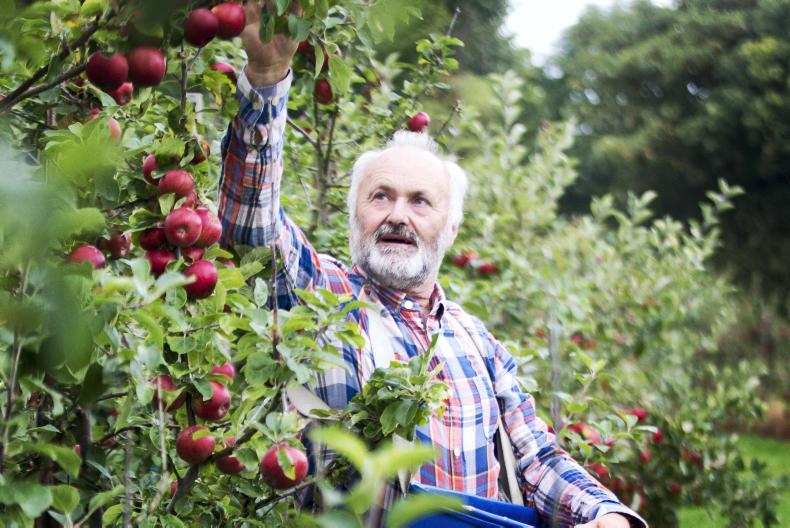A bright white picket fence indicates that Irish Country Living has arrived at Gilberts’ orchard in Quinagh, Co Carlow. Pulling up outside the farm shop, we are immediately greeted by their Hungarian vizsla dog and a warm handshake from Alan and Susan Gilbert themselves.
The orchard was planted in 1990 as a diversification programme. After farming sheep for years, Alan and Susan diversified under the misapprehension that apple trees would be easier to manage.
“Susan’s father kept sheep and cattle. He was a Wicklow man so he had to keep a few sheep. We thought apple trees would be cheaper to feed and manage” Alan says.
“At least they’d stay where we put them,” Susan adds.
An orchard is planted about every 20 years. But don’t be fooled – it’s a very labour-intensive enterprise. Every tree has to be shaped and pruned, a branch has to be facing north, south, east and west to make a table for fruit to grow. This ensures that adequate light can reach the plants so sun can ripen the apples. It’s also essential to cut back trees as too much fruit leads to smaller apples. Trees should be pruned from November to March. Harvesting is carried out in September and October, with potential to be extended to November if weather conditions allow.
Being only a stone’s throw away from Carlow town and located close to the M9, the 6.5-acre orchard is located perfectly for locals and those travelling. The orchard contains a myriad of different apple varieties, but the most popular is jonagored – the star of the show. Of Belgian decent, this variety is ideal for the Irish climate and is commended by apple growers and customers alike. Last year, the Gilberts opened up their orchard to allow members of the public to pick their own apples, which proved a great success. This year they are organising another pick-your-own day, running every Friday, Saturday and Sunday through October. It’s a great day out for families and a great opportunity for children to learn how apples are grown.
The Gilberts also produce apple juice, with both one-litre bottles and five-litre boxes on sale. They always attend Farmleigh market at Phoenix Park and sell apple juice slushies in the summer and hot apple juice with cinnamon, cloves or fruit added in the winter – an ideal alternative to mulled wine, especially at Christmas time.
Their shop is an absolute gem, with traditional apple boxes and picking crates used as furnishings. A variety of marmalades, jams, chutneys and jellies are on sale, the most unusual being the quince jelly, which goes just as well with cheese as it does on toast.
The farm shop’s best customers are eastern Europeans who buy a number of 5kg trays of apples on every visit. This is because it reminds them of home. However, many people today don’t appreciate the taste of home-grown apples as they have become so accustomed to supermarket apples.
“There is a huge difference between apples ripened on trees. In order to transport apples across the world, they have to be picked long before they are ripened so that the sugars haven’t developed,” Susan explains.
Apple farming isn’t a ready-made market – you really have to put yourself out there. Sadly, there is a high VAT of 23% on apple juice, simply because it is classified as a luxurious product.
“It’s unfortunate that when you squeeze a cow to get milk there is no VAT, but when you squeeze an apple to get juice there’s 23% VAT,” says Susan.
But the Gilberts love having apples and don’t want the era of home farms and shops to die out. Apples may not be in season all year round, but apple juice is available 365 days a year.
To find out more about their pick-your-own days and opening hours, visit Facebook or see www.gilbertsorchard.com.






SHARING OPTIONS